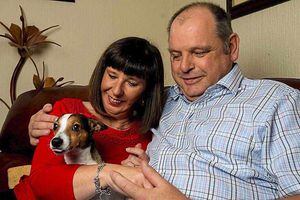A whole new life: Shropshire man whose wife donated a kidney to him speaks during Organ Donation Week
A Shropshire man whose life was saved when his wife donated one of her kidneys today spoke about the new lease of life it has given him and his hopes for the future.

Adrian Hill and his wife Nicola suffered months of turmoil, as he was in and out of hospital every few days for dialysis, and unable to do many of the simple things everyone else could do, such as go abroad, with even short breaks away proving difficult.
However speaking to the Shropshire Star during Organ Donation Week, Adrian says 2016 has been the year they started living again, after Nicola was found to be a blood match, and was able to be a living donor for her husband, donating her kidney to him last August.
Live organ donations started in 2006 when the Human Tissue Authority became responsible for regulating the practice
The most common organ donated by living people is a kidney, as a healthy person can lead a completely normal life with only one functioning kidney.
It is also possible for a living person to donate part of their liver and, in very rare circumstances, a segment of lung or small bowel.
The term non-directed altruistic donation is when a healthy living person donates an organ to an unknown recipient
It is unlawful for donors to be paid or rewarded for donating an organ or part organ
For more information, visit organdonation.nhs.uk or call 0300 123 23 23
Adrian, 48, said: "The last few months have been brilliant. We've started living again, and I'm a lot more outgoing.
"I'm able to take the dog for a walk without having to stop half way because I'm out of breath, the little things like that but then there's also being able to go caravanning again, things you take for granted when you're fit and healthy but because of my dialysis, we just weren't really able to go anywhere. It felt like our lives were on hold because our lives were being planned around it."
This year the couple, of Middleton Road in Oswestry, have celebrated their 25th wedding anniversary, enjoying a holiday in Cornwall to celebrate it, as well as marking it with a gathering with friends and family.
Nicola said: "It's been a big year for us, Ade's really turned a corner, I think really since our anniversary in June, we've had a busy few months with that, then there's been the fundraising that we've been doing but we've been fine, we've been able to manage it all."
Following the transplant, the Hills have raised a total of £4,886 for the British Kidney Patient Association, through events such as a race night and treasure hunt, to say thank you and give something back for the support the charity has given them.

But it is also because Adrian could be back to square one again in the coming years as the average kidney lasts between 10 and 15 years, meaning he could potentially need another transplant later in life.
"People think transplant is a cure but it's not, it's a treatment, and if I do need another one, until another does come along I will have to go back on dialysis," he said.
Nicola, 46, said: "In theory Ade might have to have another kidney by about the age of about 60, and if that is the case, we will cross that bridge when we come to it. They say living donation kidneys last longer because they know more about who it's come from.
"This is why we will always push for fundraising and to get the word out there about donation."
According to Kidney Research UK, 50 per cent of deceased donor kidneys last 15 years, while 60 per cent of live donor kidneys last the same amount of time.
Adrian had been born with one kidney and at the age of 38 was diagnosed with chronic kidney disease.
Although he always knew the disease would eventually result in him needing a donor, he never imagined that person would come in the form of Nicola, and today he remains proud of that.
"It really is the best thing I've ever had, I'm still so proud of Nic, and will forever feel thankful," he said.
"What Nic did for me was just amazing but I think something that's truly incredible is that there are people out there who are donating their kidneys to complete strangers, that's really amazing."
Speaking about his hopes and ambitions over the next 12 months, Adrian said: "I'm hoping to return to work of some kind but only part time, holidays but to be honest I'm just looking forward to leading a normal lifestyle. Whatever that is!
Nicola said: "He's said to me when I've complained about going to work, you should be grateful you're going, think about me stuck at home, so that did make me think and make me realise, he's turning a corner."
The Hills also say they want to continue to encourage people to sign up to become organ donors and carry a donor card.
This week it was revealed that the number of families agreeing that their loved ones' organs can be donated for transplantation may be rising more quickly in Wales than other parts of the UK following the introduction of the ground-breaking opt in or opt out consent system last December.
Health officials and ministers in Wales said they are encouraged by how the so-called "deemed consent" system is working and NHS Blood and Transplant (NHSBT) has said the picture in Wales is promising.
Under the new Welsh system, residents are deemed to have consented to organ donation unless they positively opt out.
In June the Welsh Government said the scheme had already saved dozens of lives after revealing that in the first six months, of the 60 organs that were transplanted, 32 came from people whose consent had been "deemed". This week the Shrewsbury and Telford Hospital NHS Trust revealed over the past five years, 27 patients donated their organs after they died.
Every day across the UK, around three people who could have benefited from a transplant die because there aren't enough organ donors. In Shropshire around 39 people are on the active waiting list for a transplant. Yet, of the approximately half a million people who die each year across the UK, only around one per cent (5,603) die in circumstances where their organs could be donated.
With such small numbers of people dying in the right circumstances to become an organ donor and so many adults and children in need of a transplant, it is vital that no opportunity for someone to become a donor is missed.
Many people believe that all you need to do to show you want to be a donor is to join the NHS Organ Donor Register. However, if you die in circumstances where you could become an organ donor your family would be approached by specialist nurses and asked to support your decision to donate.
NHS Blood and Transplant figures show that only 47 per cent of families agree to organ donation if they are unaware of their relative's decision to be a donor. Yet almost 90 per cent of families give their consent when the decision to be an organ donor is known.
Adrian said: "In Wales this new system is making a real difference, so why isn't it happening here?
"Although 27 patients donating their organs after they've died over the past five years is something, it isn't high enough. I do think a system like Wales' would make a difference here in England.
"I want to tell anyone who will listen, there's no harm in carrying a donor card but those who do need to tell their families they're carrying a card, otherwise they may never know and it's the last thing families think about when they're grieving."
He added: "I know just how important this is but it's making sure everyone else does."





